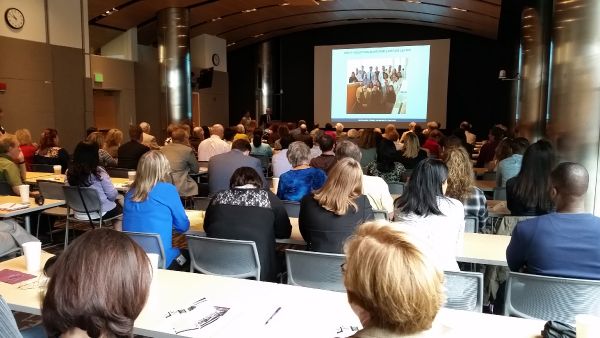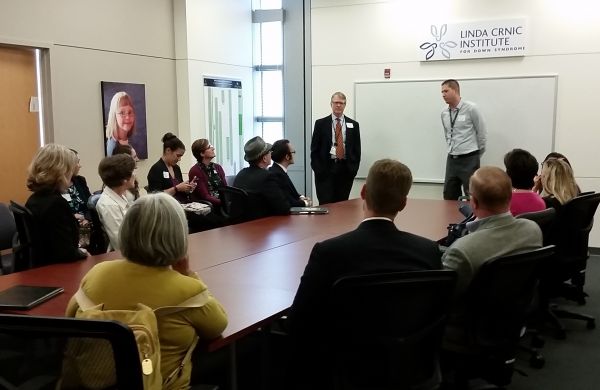Colorado Researchers Are Working To End Alzheimer’s
Lawmakers across the state learn how Alzheimer’s disease impacts Colorado families
Did you know that research to find effective treatments and a cure for Alzheimer’s disease is happening right here in Colorado? The University of Colorado, Anschutz Medical Campus is home to the Rocky Mountain Alzheimer’s Disease Center (RMADC). The Alzheimer’s Association of Colorado recently partnered with the University to give congressional staff, state lawmakers, and others a chance to learn how the RMADC is contributing to the global effort to end Alzheimer’s disease. We also used this event to highlight why Alzheimer’s is an issue that should matter to every federal and state lawmaker.
Who Attended
Staff from six congressional offices and several state legislators and candidates attended this event along with constituents from the University of Colorado and Alzheimer’s Association of Colorado. Hosting lawmakers from Congress and the Colorado General Assembly at this event was important because Alzheimer’s impacts their constituents and the budget they vote on each year.
Why Alzheimer’s Should Matter To Lawmakers
Alzheimer’s doesn’t discriminate—age is the primary risk factor. It is also a family disease. Roughly 92 percent of people with Alzheimer’s or another form of dementia rely on informal (i.e., family, unpaid) caregivers. Thus, while there are 67,000 Coloradans living with the disease, many more people are impacted by it.
The disease is also having an increasing impact on our federal and state budgets. This year alone, the Medicare and Medicaid programs will spend $160 billion caring for people with Alzheimer’s and other dementias across our country. The Colorado Medicaid program cares for people with no place else to turn for health care services. That program will spend $508 million this year caring for Coloradans with dementia, including people with Alzheimer’s. These numbers sound staggering, but they are set to increase dramatically. Due to the aging of our population and other factors specific to our state, the number of Coloradans living with Alzheimer’s is expected to grow by 37 percent by 2025—in less than 10 years. That makes Alzheimer’s an issue that cannot be ignored by the lawmakers responsible for managing this developing budgetary crisis.
The good news is that this budgetary problem has a solution. Investments in research—like work done at the RMADC—have the potential to bring treatments and a cure to Alzheimer’s families, reducing future Alzheimer’s-related health care costs. The federal government currently supports Alzheimer’s research through the National Institutes of Health, and the State of Colorado provides support directly to the RMADC. These investments are critical to continuing the fight against Alzheimer’s and bringing this mounting budgetary issue under control.
 What They Learned
What They Learned
During this event, lawmakers and other attendees learned what researchers know about Alzheimer’s, what they don’t know, and the specific research being conducted at the RMADC. This work includes efforts to work across conditions, such as Down Syndrome and Rheumatoid Arthritis, to find existing ways the brain may protect itself from or be more susceptible to Alzheimer’s disease. Researchers discussed their specific activities and how each could contribute to the effort to find the first Alzheimer’s survivor.
Lawmakers also learned about a recent $1 million grant award made by the Alzheimer’s Association to the RMADC to investigate the role inflammation in the brain may have in Alzheimer’s and other brain diseases. The Alzheimer’s Association is the largest nonprofit funder of Alzheimer’s research, and this award was part of our Part the Cloud initiative, which funds research with the highest probability of slowing, stopping, or ultimately curing Alzheimer’s disease.
Thank You!
We want to thank the University of Colorado, Anschutz Medical Campus and RMADC for partnering with us to make this event possible. We also want to thank the congressional staff, state legislators, candidates, and others who took the time to learn about why Colorado scientists and researchers are a critical part of the effort to end this disease.

